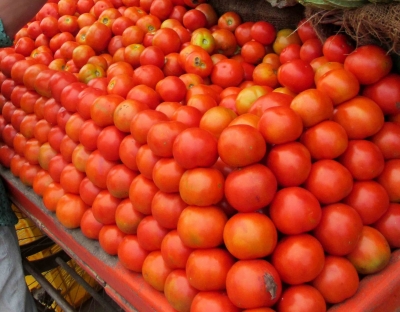New Delhi, March 17 : Winds, droughts, and heavy storms are affecting key agricultural regions around the world, causing many farms to fall short of their required product demand, say scientists.
Take the case of tomatoes in Italy, the largest tomato producer in Europe, supplying an average of 6-7 million metric tonnes per year.
However last year, farms in northern Italy were 19 per cent under the contracted volumes and sadly, this is expected to decline even further.
This is because the climate, that was once a warm paradise perfect to grow the fruit, is now becoming colder and more susceptible to rain.
These lower temperatures are slowing the ripening process of the fruit, and in 2019 less than half of the contracted volumes were produced on time.
If this continues to happen, the supermarket prices will continue to increase and “we could begin to see shortages on the shelves”.
CIA Landlords have researched how climate change has affected the production of five of the world’s most loved produce, including tomatoes, and revealed the most catastrophic climate events that have occurred recently to plummet their growth.
Italy’s forests have also declined in recent years because cows in Italy, which are used to produce afine leather goods,’ are needing the space to be reared.
This, in turn, has decreased the amount of oxygen and CO2 in the air.This will have a negative effect on citizens’ health — polluted air cannot just exacerbate existing respiratory illnesses but also cause them.
The global climate is predicted to change drastically in years to come due to the effects of human-caused climate change.
Scientists have claimed the world has until 2040 to reduce the effects of climate change and if “we refuse to act now we will reach a apoint of no return’ by this time”.
But how will the effects of climate change present itself in the food industry?
Besides tomatoes, almonds, coffee, hazelnuts and soybeans are among some of the produce most affected by climate change.
California grows 80 per cent of the world’s export of almonds and the state’s industry is now worth $6 billion.
However, the growing process of almonds is lengthy and requires a lot of both physical and human energy.
California uses 60 per cent of the honeybee hives in the country just for almond pollination each winter, and the cost of transporting the bees, and keeping them in cold storage until this point means that the carbon footprint of almond production is huge.
Almonds also require the most water to grow out of all nuts, just one seed needs 3.2 gallons to reach the size needed in order to be turned to milk.
This is becoming increasingly difficult as the popularity of almond milk has risen — this diary alternative makes up 63 per cent of the plant-based milk market.
However, droughts across California are causing farmers to abandon their orchards as there is barely enough water to sustain them.
The droughts have also meant farmers are having to treat the almonds with different pesticides, some of which are deadly for honeybees, an already endangered species.
As a result California could begin to see a decline in greenery and flowers, that the bees would have pollinated, and the price of almonds could rise.
So is the case with soybeans.
The weather in Brazil is becoming hotter and drier.
But with soybeans growing best in warm and moist climates, farmers are having to adapt how they grow the crop.
By using different pesticides, and forcing the plants to become more tolerant of different climates, farmers have been able to effectively increase the amount of soybeans produced.
However, this is not sustainable as the climate will continue to worsen.Consequently, it is forecasted that the soybean production will decrease by 86-92 per cent by 2050.
Soybean plants also require lots of space, and land throughout Brazil has been deforested to make way for rows upon rows of the crop.This has occurred most in the Amazon, where mass fires have been lit to make room for the crops, as a result scientists have confirmed the rainforest now emits more CO2 than it absorbs.
“This is a global problem as we rely upon the Amazon to provide us with six per cent of the world’s oxygen supply and to keep carbon out of the atmosphere.If we continue to destroy this space, the air quality of our planet will decrease and global warming will be exacerbated,” warn scientists.
This will present itself in increased temperatures, changing rainfall patterns and biodiversity and agriculture will decline around the world.
According to research by CIA Landlords, the coffee production is predicted to reduce by 76 per cent in Brazil in the next few years due to the drying climate the country is being hit with.
This is because coffee plants grow at their best in moist, tropical climates, with soils and temperatures that reach around 21 degrees Celsius.
However, climate change is drying the air in Brazil, making the climate less than ideal for growth, causing a decline in coffee bean production.
But it is not all sad news for the latte lovers out there as Italy is hoping to be able to produce the nation’s favourite bean soon due to their rising temperature.
vg/ksk/
#Tomatoes #almonds #coffee #Delhi #Delhi #New Delhi #Amazon







